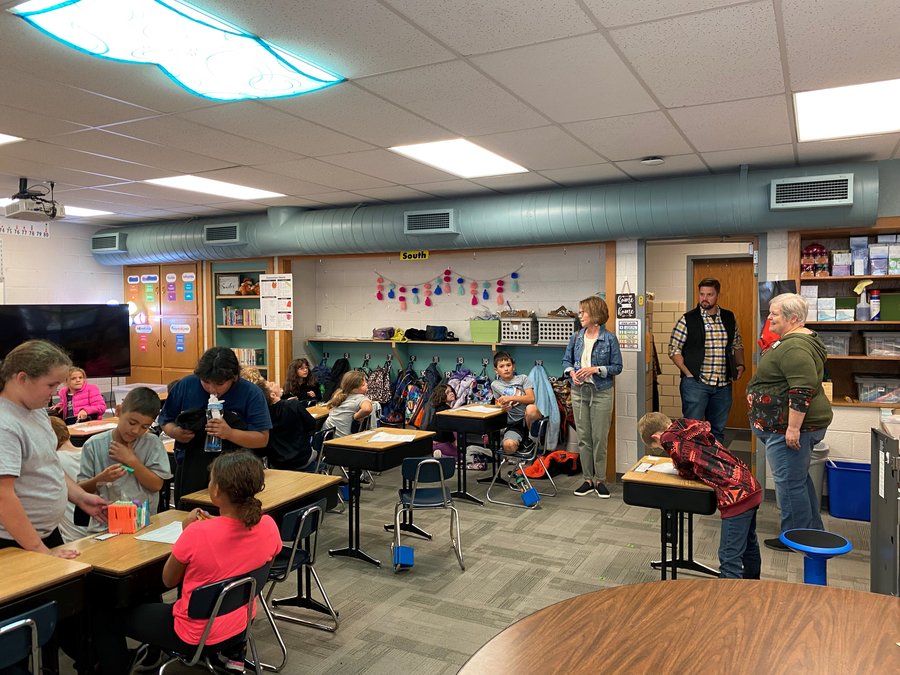A building report from Eisenhower Elementary School wouldn’t be complete without a mention of Little Panthers Preschool.
Eisenhower hosted the Great Bend USD 428 Board of Education luncheon meeting on Tuesday. Principal JoAnn Blevins and staff talked about school improvement efforts. Little Panthers Preschool opened in 2021 under the direction of Eisenhower, even though it is located off-site at 3400 21st St.
“We have 277 students here at the Eisenhower building and 47 at Little Panthers Preschool,” Blevins said.
Later in the meeting, reporting on the preschool, Blevins noted, “The kindergarten teachers are very excited about the kids’ level of readiness for kindergarten.” In preschool, they learn to hold a pencil, write their name, count to 10, and recognize numbers and letters. They also learn to self-regulate as they gain social-emotional skills.
“By kindergarten, they are ready to start learning reading and writing,” Blevins said. “It’s an important beginning to success.”
A video from the preschool showed the kids having fun, but they are also getting a jump start on education, Blevins said. All of last year’s preschoolers are testing in Tier 1, which means they aren’t just at “grade level” in their reading and math understanding; they are on solid ground to move ahead.
In contrast, Tier 2 may be proficient but are at risk of dropping below the expected proficiency into Tier 3 – the group that needs intervention to catch up.
“So, early learning matters,” Blevins concluded.
Exciting numbers
There was also good news at the Eisenhower building, Blevins said.
“This is something we are really excited about: 84% of our kids, pre-K through sixth, are on grade level for math. In 2019, it was 83%, so despite a pandemic, we’re on grade level.” This means they have the skills they should have for their grade. In addition, 66% are considered “Tier 1" which denotes more than the minimum grade-level proficiency. Being in Tier 2 indicates proficiency, but they are at risk of falling off.
“Our next data point for you is, 85% of our kids pre-K through six are on grade level for reading,” Blevins said. “This is where it’s really exciting. It was 76% in 2019, so we pulled that up during a pandemic; 57% of our kids are funneling into Tier 1 and 28% in Tier 2. We’re pretty excited to see those numbers go in the right direction, especially that reading number, thinking about all of the challenges that we’ve had the last year and a half or so...
“So how did we get there? We got there through a number of things.” The first task was focusing on creating a “culture and climate for learning,” she said. “We really dove deep into trauma-informed practices, and have been in the last several years, and we’re really starting to see the benefits of that and relationship-building. We really feel like we’ve turned a corner with some of our kids.”
In spite of this good news, Blevins said the effects of the COVID-19 pandemic have had a negative effect on state assessment tests. On these tests, unlike the tiers referenced above, levels 3 and 4 indicate students are on track to be college- and career-ready.
“The data that we are using from state assessments reflects the number of students in Levels 3 and 4, which are the college and career-ready levels,” Blevins said. “These levels indicate the ability to apply learning, more than just recall information. The number of students scoring in these levels has declined as a result of the pandemic. During the shutdown and for a good portion of the following school year, we were trying to help students just make it back up to grade level proficiency, which we have been able to do as indicated by benchmark assessments showing that 85% of our students are on grade level. Our next step is to go beyond grade level proficiency and support the critical thinking skills needed to apply learning and score in levels 3 and 4 on the Kansas State Assessment.”
It’s not too early to discuss college and career readiness, Blevins said. Whatever the students will be doing later in life, the reading and math skills they will most likely use are skills that they start to learn at the elementary level.
Ending business
The school board also took a tour of the school and voted to approve the following grants and contributions:
• Great Bend High School’s HOSA (Health Occupations Students of America) Club for future health professionals received $1,000 from the University of Kansas Health System and $250 from Catalyst Therapy & Sports Rehabilitation.
• The Panther Booster Club donated $31,350 to the GBHS Athletic Department
• Lincoln Elementary received $478.47 in reward incentive contributions from Kroger.





